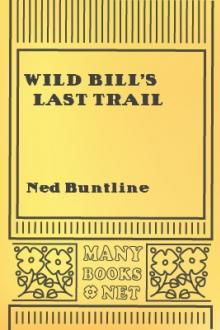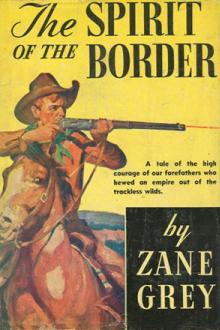Sunset Pass; or, Running the Gauntlet Through Apache Land, Charles King [digital ebook reader TXT] 📗

- Author: Charles King
Book online «Sunset Pass; or, Running the Gauntlet Through Apache Land, Charles King [digital ebook reader TXT] 📗». Author Charles King
"If I only had those poor little kids safe with their father nothing would suit me better than to be here with four or five of the old 'Troop' and let the whole of the Apache nation try to rout me out," he said to himself. "Even as it is, I'm bloodthirsty enough now, after what I've seen and heard to-night, to be impatient for their attack. By gad! we've got a surprise in store for them if only Jim don't get stampeded."
Turning to listen for sounds from his little garrison, Pike could distinguish two that were audible and that prevailed above all or any others: Kate was tearfully moaning and praying aloud; Jim placidly snoring.
"That nigger could lie down and go to sleep, by thunder, if he knew the world was coming to an end in less than an hour. I'll have to watch here till nearly dawn and have the strongest coffee I can brew all ready for him or he'll be going to sleep on his post and letting those hounds crawl right upon us. Coffee's a good idea! I'll have some myself."
So saying the veteran stole back into the cave, noiselessly filled the battered coffee-pot and set it on the coals, said a few reassuring words to Kate and begged her to remember him in her prayers, laughed at her doleful and despairing reply and returned to his post.
All quiet. Even the wild-cat had disappeared and there was now no longer light by which he could have detected the creature. Pike almost wished he hadn't gone, for, as he grimly said, the fellow might have been good company and kept him from getting sleepy. Little by little the Indian chant was getting drowsy and the weird dancers, some of the younger braves, tired of the sport when there were neither admiring squaws or approving old chiefs to look on. The chiefs in this case, of course, had consumed the greater portion of the whiskey and were now sleeping off its soporific effects, and the youngsters could only remain where they were, keep watch and ward against surprise, and make no move in any direction until their elders should be themselves again, unless the sudden coming of enemies should compel them to rouse their leaders from their drunken slumbers and skip like so many goats for the highest parts of the mountain.
Looking at his watch as he sipped his tin of coffee Pike noticed that it was now eleven o'clock. "Oh, if I only knew that all was well with the captain," he muttered. "And if I only knew where Sieber and the cavalry were to-night."
Not until after two o'clock in the morning did the old soldier decide that it was time to "turn over the command" and seek a little rest himself. He knew that he would not be half fit for the responsibilities of the coming day unless he could get a few hours' sleep, and as Jim had now been snoring uninterruptedly for over four hours, Pike concluded to call him, give him some strong coffee and some sharp instructions, and put him "on post." It took no little shaking and kicking to rouse the boy, but presently he sat up, just as he had done at the ambulance, with the yawning inquiry, "What's the matter?"
"Nearly half-past two, Jim, and your turn for guard. Stir out here, now. Douse your head with some of this cold water. It will freshen you up. Then I'll give you a good tin of coffee."
Jim obeyed, and after stumbling stupidly around a moment, and then having a gourd or two of water dashed over his face and neck, he pronounced himself all right and proceeded to enjoy the coffee handed him.
"Now, Jim," said Pike, "the wild-cat's gone, and no Apaches will be apt to prowl up here to-night, but I want you to keep the sharpest lookout you ever did in all your life—not only over their movements down in the road, but for cavalry coming from the west. There's just no telling how soon those fellows may be out from Verde, and when they come we want to know it. The Indians have their sentries out, so they evidently expect them. Watch them like a hawk, but don't give any false alarm or make any noise. Let me sleep until it begins to get light, then call me. Now, can you do it?"
"Of course I can, corporal, but where are you going to sleep?"
"Right here by you. I'll hand your blankets and mine out by the parapet, so that if you want me, all you have to do is put out your hand. If you are chilly, or get so towards daybreak, throw that saddle blanket over your shoulders."
For a long time, despite fatigue and watching, Pike could not get to sleep. He lay there looking up at the stars shining in the clear heavens and thinking how peaceful, how far removed from strife or battle, they seemed to be. Then he kept an eye on Jim, and was glad to note that the darkey seemed alert and aware of his responsibilities, for every few minutes he would creep out and peer around the shoulder of the ledge where he could get a better view of anything going on down in the road, and, after half an hour of this sort of thing, he reported to Pike that he "reckoned the whole gang had gone to sleep down there." The old trooper assured him, however, that some must be on the alert and warned him to relax in no way his vigilance, and then at last wearied Nature asserted her rights, and the soldier fell asleep.
Four o'clock came,—five o'clock,—and there had been no sound from below. Then, far in the east the skies began to hoist their colors in honor of the coming Day God, and rich crimson and purple soon blended with the richer gold, and all around the rocky fastness the pale, wan light of the infant morn stole over rock and tree, and still old Pike slept, but not the deep, restful slumber of three hours before. He was dreaming, and his dreams were troubled, for his limbs were twitching; he rolled over and moaned aloud; inarticulate sounds escaped from his lips; but still, as one laboring with nightmare, he could not wake—could not shake off the visions that oppressed him. In his sleep he saw, and saw beyond possibility of doubt, that the Apaches were hurriedly rousing their comrades; that they were quickly picking up their rifles and then nimbly speeding up the rocks; that even as they came towards him up the mountain side several of their number went crouching along towards the east and eagerly watching the roadway through the Pass, and, following their fierce eyes, he could see, winding up the gorge, coming at a trot, a troop of the longed-for cavalry—coming not from the west, as he had expected, but from the direction of the magnificent sunrise that flashed on their carbines and tinged the campaign hats with crimson. At their head rode two officers, and one, he knew at once, must be his old captain, but why that bandage about his head? Why the rude sling in which his arm was carried? Plainly visible though they were to him, the Apaches were completely hidden from the approaching troops. Two minutes' ride brought the leaders to the smouldering ruins of the baggage wagon, at sight of which, and the charred and unrecognizable body in their midst, his captain had groaned aloud, then forced his "broncho" up the rocky path to where they had made their camp, and then, when he saw the ruined ambulance and all the evidences of Apache triumph, he reeled in his saddle and would have fallen headlong had not two stout troopers held him while their young lieutenant thrust a flask of brandy between the ashen lips; and then in his wild vision Pike saw them ride on and on up the road right beneath them—only a quarter of a mile away—never heeding, never looking for him and his precious charges. He strove to shout: he screamed aloud, yet only a suffocated groan seemed to issue from his lips; he shouted to Jim to fire and so attract their attention, but there was no response; and then, in his agony, he started up, wide awake in an instant, and, hurling off his blankets, seized his rifle and sprang to his feet.
Broad daylight; sunbeams dancing through the trees; and there, doubled up at the back of the parapet, lay that scoundrel Jim—asleep on guard. One vehement kick and curse he gave him: then peered over the barrier down the rocky hillside. God of heaven! what a sight met his eyes! The Apaches were almost on them.
 ONE VEHEMENT KICK AND CURSE HE GAVE HIM.
CHAPTER VIII.
THE CAPTAIN'S RIDE.
ONE VEHEMENT KICK AND CURSE HE GAVE HIM.
CHAPTER VIII.
THE CAPTAIN'S RIDE.
It is high time now that we should hear something of Captain Gwynne himself, and leave for the time our little garrison in the cave at Sunset Pass. Let us follow the movements of the father for whom the children were so anxiously and tearfully praying.
Galloping away on Pike's horse in close pursuit, as he supposed, of Manuelito and the mules, the captain had turned south the moment he cleared the rocky buttresses that formed the western gateway to the Pass. He had reasoned that the Mexican would not dare go back along the road on which they came, because in so doing he must infallibly run straight into the Apaches, who were following in pursuit. Knowing, as did Pike, that Manuelito was well acquainted with the short cut through the mountains down to the valley of the Verde, miles to the south of the winding and roundabout way on which they were compelled to come by road; knowing, too, that this trail was far to the south of where they had seen the Indians' signal fires,—Gwynne's whole idea seemed to be that Manuelito would take the shortest line to reach that rough but easily known trail. He did not hesitate, then, a moment in turning short to the south, and riding confidently along to the western foothills, expecting every moment to hear the bray of the mules or the sound of their hoof beats. He knew that the moment these creatures heard the hoof beats of his own horse, they would be almost sure to signal. Just what to do with Manuelito himself, he had not yet determined; but it was his purpose to force him back to camp at the point of the pistol, if necessary; then to bind him to the wagon; make him drive, at least until they reached Fort Wingate over in New Mexico beyond the Navajo Reservation, and turn him over there to the military authorities for such disposition as they might choose to make of him. Of course, he would have no further employment in Arizona, for his character was blasted forever. Mile after mile, however, the captain rode without hearing one of the anticipated sounds, and the further he rode the lighter it grew. Far down, to the south, now, he could dimly see objects that looked like four-footed creatures, moving rapidly. Unluckily, he had with him only a light, short-ranged pair of glasses, and he could not distinctly make out what they were; but believing that they could be nothing but Manuelito and the mules, he put spurs to his weary horse, and pushed rapidly in pursuit—wondering, however, how it was that the Mexican, with the slow-moving mules, could have got so far to the front. Five miles further he rode and by that time the sun was up above the mountains of New Mexico, over to the east, and lighting up the whole plateau to his right. By this time, too, the objects, of which he had been in pursuit, had totally disappeared from his sight, and looking around him he could see nowhere sign of hoof or any trail that would indicate that the mules had come that way. However, as he might be anywhere from ten yards to ten miles





Comments (0)